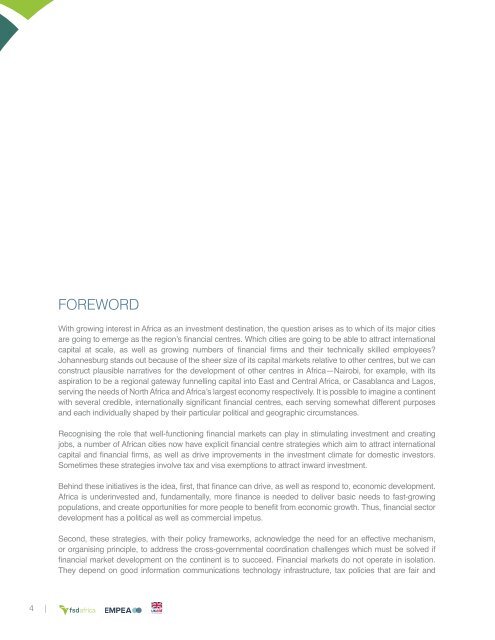Create successful ePaper yourself
Turn your PDF publications into a flip-book with our unique Google optimized e-Paper software.
FOREWORD<br />
With growing interest in Africa as an investment destination, the question arises as to which <strong>of</strong> its major cities<br />
are going to emerge as the region’s financial centres. Which cities are going to be able to attract international<br />
capital at scale, as well as growing numbers <strong>of</strong> financial firms and their technically skilled employees?<br />
Johannesburg stands out because <strong>of</strong> the sheer size <strong>of</strong> its capital markets relative to other centres, but we can<br />
construct plausible narratives for the development <strong>of</strong> other centres in Africa—Nairobi, for example, with its<br />
aspiration to be a regional gateway funnelling capital into East and Central Africa, or Casablanca and Lagos,<br />
serving the needs <strong>of</strong> North Africa and Africa’s largest economy respectively. It is possible to imagine a continent<br />
with several credible, internationally significant financial centres, each serving somewhat different purposes<br />
and each individually shaped by their particular political and geographic circumstances.<br />
Recognising the role that well-functioning financial markets can play in stimulating investment and creating<br />
jobs, a number <strong>of</strong> African cities now have explicit financial centre strategies which aim to attract international<br />
capital and financial firms, as well as drive improvements in the investment climate for domestic investors.<br />
Sometimes these strategies involve tax and visa exemptions to attract inward investment.<br />
Behind these initiatives is the idea, first, that finance can drive, as well as respond to, economic development.<br />
Africa is underinvested and, fundamentally, more finance is needed to deliver basic needs to fast-growing<br />
populations, and create opportunities for more people to benefit from economic growth. Thus, financial sector<br />
development has a political as well as commercial impetus.<br />
Second, these strategies, with their policy frameworks, acknowledge the need for an effective mechanism,<br />
or organising principle, to address the cross-governmental coordination challenges which must be solved if<br />
financial market development on the continent is to succeed. Financial markets do not operate in isolation.<br />
They depend on good information communications technology infrastructure, tax policies that are fair and<br />
4 |





